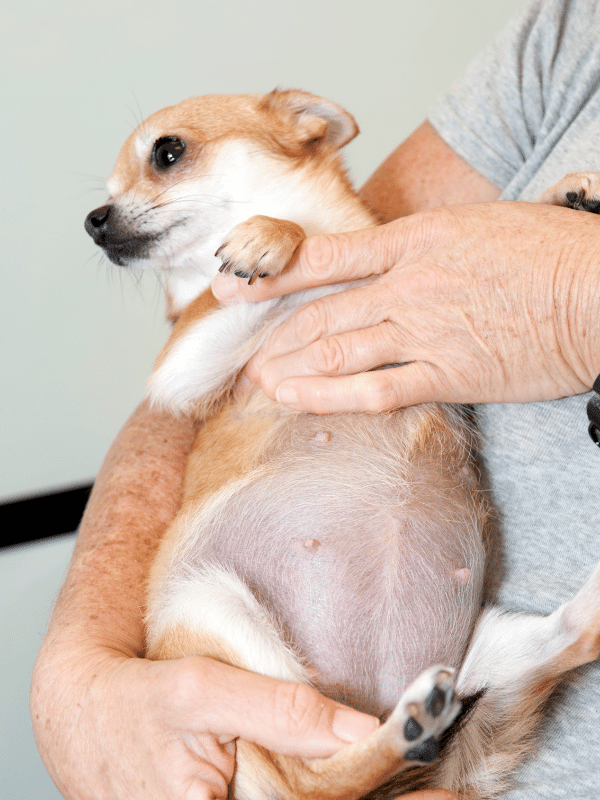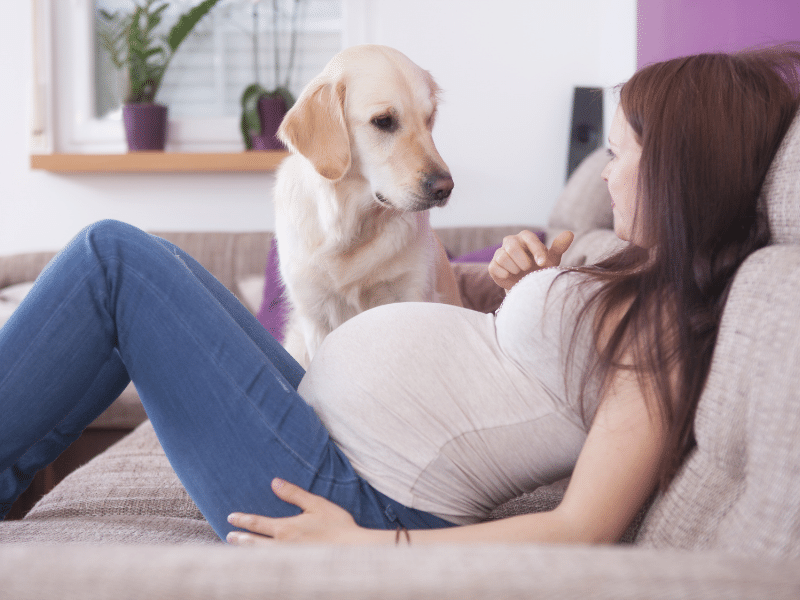
Is your mature dog’s sudden clinginess making you wonder, “why is my dog so clingy all of a sudden?”
If you’re a dog owner, your furry friend might need constant affection and approval from you. Whether they’re Golden Retriever, German Shepherds, or Bernese Mountain dogs, they all love the affection and appreciation moments. Yet, a dog’s sudden attachment forces you to know the reasons why your dog does it so.
Clingy dogs exist everywhere. You don’t need to get afraid of clingy dogs or their sudden clinginess. In this article, we’ve discussed the alarming reasons that make you intrigued, “why is my do so attached to me all of a sudden?”
Along with this, we’ve also proposed several effective solutions to help you get your dog back to normal from this sudden clingy behavior. Let’s learn all about them.
Contents
Separation Anxiety Can Be the Primary Reason Why Your Dog is So Attached to you?
Separation anxiety is normally noticed in affectionate pet dogs, not in all dogs, and it can be a root cause to tend them clingy. Two out of every five dogs suffer from this anxiety, with clear indicators or no signs at all.
REMEMBER, TRUE SEPARATION ANXIETY IS RARE IN DOGS.
Then, what exactly is separation anxiety that persists most commonly in dogs?
It’s related to their past and health conditions. For instance, even the gonadectomy at an early age could be linked to separation anxiety in dogs, according to research. The moderate type can be treated through a few guidelines, which we’ll discuss later.
Dogs are relatively caring in nature and can have a compassionate sudden attachment level with their owners, whether they’re rescue dogs or adopted. Within a few minutes of separation from the owner, they can immediately get dull and sad. So, usually, you can easily notice this anxiety just right after separation.
But what about long-term separation anxiety? Yes, long-term separation anxiety happens and might affect a dog physically. It also leads to the same clingy behavior discussed in the article.
Symptoms of separation anxiety in dogs
Dog with Separation Anxiety panics in both silence and noise. Symptoms vary from dog to dog and breed to breed.
It sometimes entirely depends on the dogs’ attachment style or the bond level with its owner.
The symptoms may include anorexia, chewing, barking, howling, vomiting, coprophagia, and changes in eating habits. Dogs can also change their sleeping schedules, affecting their moods.
Because of the separation from their beloved caretakers, a dog’s clinginess makes them act wholly different and destructive. It’s why, sometimes, other pairing symptoms like excessive drooling, panting, and fear can also be noticeable.
Many dogs have also been observed to turn completely silent. They may also hesitate to communicate with you at points where they find it hard to process their feelings.
When can your dog have separation anxiety?
Anxiety is a feeling that can arise anytime in humans and animals. It’s undoubtedly the most complex feeling to read.
It can hit your dog anytime in the day or at night. But some specific reasons can cause your dog to feel anxious as follows.
- Ownership change tht with the fear that they would be abandoned again
- Left alone by the owner
- Not receiving proper attention
- Some abuse
- Change of apartment/house
- An unhealthy diet or sleeping patterns
- Death of owner’s family member
- Death of another pet
The destructive behavior, however, can be a sign of a poorly trained dog.
How can you treat your dog’s separation anxiety in few steps?
As said earlier, treating clingy dogs with true separation anxiety is not simple. They go through so many emotions, and, as humans, you won’t be able to interpret all of them in one go.
First, you’ll need to assure your dog’s feeling is temporary, and everything will be okay, i.e., the anxiety is treatable at home.
Second, if you’re on a trip, you might also need to ask your partner to risk their midnight sleep to ensure your dog is safe.
Most of the time, different tactics work well in such cases.
If you’re your dog’s favorite person, the most effective strategy to deal with your dog’s separation anxiety is following the tips mentioned below before leaving and after returning home.
Hire a professional caretake
Domestic dogs cannot survive alone for long periods. If you’re leaving them alone for extended periods, then hiring a professional caretaker will help your dog minimize their separation anxiety.
Professional pet caretakers know the psychology behind slight emotional disturbances your dog may face during the separation phase. That’s why trusting the certified caretakers is always preferred. However, if you’re unable to hire a professional caretaker, you can ask any reliable friends or family to take care of your beloved pet.
Provide enticing chew toys or balls
Young dogs love to have their favorite toys around them, especially chewable or throwable, but still survive the horrendous treatments. Such toys are highly effective for keeping your dog occupied all day.
Take your dog for a long walk before leaving.
A research survey on dogs during COVID, 19 shows that when restricted to home and deprived of walks, the dogs tend to become clingy, as reported by their owners. It also indicates daily walks allow your dog to remain active and keep it healthy.
In addition, when dogs walk a long way, it makes them tired. Because of tiredness, they get less concerned about surrounding events and occurrences.
Their fatigue will always make your departure easy because you’ll easily trick them into not caring about your absence.
Offers fewer treats at the time of arrival and departure.
Ensure to give them fewer treats before leaving and after returning so that they cannot naturally sense your arrival or departure, linking the treats with your specific routines.
Additionally, dogs always remember the sweet stuff you do to make them happy, which somehow makes them attached to you. So it means the more treats, the more they’ll remember you, and as a result, they may get over-attached, which may cause severe anxiety in them.
Avoid an overly attachment to compensate the sepreration period.
Most of the time, the biggest mistake that makes dogs clingy is the owner’s efforts to make their dog believe that they love them. They do so by offering the dog to sleep with them, etc. And according to the experts, it causes hyper-attachment in your dog.
The key is separation or attachment; both can cause your pup’s clinginess when not in moderation.
Can separation anxiety be fatal for dogs?
Dogs get extremely sensitive about the loss of a beloved person. You can find them chewing harmful, indigestible stuff that can become a reason for their death. Some often observe that dogs may indulge in activities that may lead to consequences that severely hurt themselves.
In such conditions, you must keep your eyes on them at all times. If you’re at work, it’s vital to install cameras in your home to notice any disturbances or activities they might cause.
Anxiety itself doesn’t cause a dog to die, but it can damage your dog’s healthy lifestyle. Constant anxiety attacks can also make them indecisive, affecting their decision-making powers and other cognitive abilities, leading to dependency.
Give them necessities and a reliable company, for instance, your friend or relative’s company. Thus, you can keep them safe from severe fatal anxiety by leaving them in a separate room until you return from your 9 to 5 job.
These strategies can help you deal with these emotionally sensitive beings daily.
4 Other Reasons Why Your Dog is Clingy Suddenly?
Besides separation anxiety, the following reasons may become prominent for your dog’s clinginess.
1. The heat cycle can be reason behind a clingy dog.
Heat is a common factor that makes female dogs go crazy to turn into velcro dogs in the heat cycle. You can see hormones inflicting emotional desperation over them during this period of three weeks.
The desperation causes dogs to ask for love from anybody and appear as velcro dogs. When I say anybody, that means anybody, including human babies.
Because of this heat, many people often prefer to spay their female dogs just right after they reach adulthood. Spaying protects them from getting hurt by stray dogs or lost and, at worst, die from injuries or through sexually transmitted diseases.
Unspayed female dogs can be clingy all of sudden.
During heat, the female dog’s body goes through hormonal changes. Which causes mood swings and the body desires more love and affection than ever before.
You’ll notice significant changes happening in their behavior along with the body. The most visible physical changes you may face are their love for attention and affection, like a velcro dog. Other physical symptoms include swollen vulva and vaginal bleeding.
Dogs’ behavior can rapidly switch from soft to sore if they’re unspayed. You’ll often find your female dog clingy, in an unusual position, rolling on the floor, and just minutes after rolling, you may find it barking at the other dogs.
Heat happens at least two times a year and three times a year with large breed dogs and remains for two weeks at most. So if your dog is not spayed, then you can expect clinginess.
It solely depends on your decision whether to spay your dog or keep it unspayed. But the best thing to do is to spay your dog. However, if you can bear your female dog’s behavior, then it’s perfectly fine for you to keep it unspayed.
It’s surely a hard time for your female dog’s emotions, but there is nothing special you can do to relax her except provide it with a cozy and calm massage. In most cases, it won’t give you a hard time. As the dog ages, getting along with their emotional stuff gets easier.
2. Dementia can also cause a dog’s sudden clinginess.
Diseases, ahh! The saddest part about keeping a pet is to see them in pain or cognitive lacking during their older age.
It hurts to see the pets you have spent a long time with go through such havoc. The disease that might keep your dog clingy all day night long is possibly Dementia, also known as Canine Cognitive Dysfunction Syndrome.
What is Canine Cognitive Dysfunction Syndrome?
Dementia is a disease that causes illnesses in your dog’s brain. It rots the cognitive abilities that normal healthy dogs possess. So, the lack of normal mental abilities can cause your dog to take support through you.
It is estimated that 50 to 60% of dogs get exposed to Dementia by the age of 12, whereas possibly over 68% suffer from Dementia at the age of 15. It’s a horrific rate for dementia patients in dogs, considering that the disease is untreatable.
Just like human dementia patients, all dogs suffer from challenges like:
- Confusion,
- Anxiety,
- Irritation,
- Things are hard to remember,
- Even the names or places are easy to forget, may pace aimlessly,
- Don’t find the urge to play outside anymore, slow in normal daily routine tasks, disorientation,
- Don’t feel the desire to eat food, sleeping disorder, and
- Hard to recognize familiar faces, including the owner.
While suffering from dementia, your dog suddenly barks at things. It can also disappear for long periods or give signs of getting afraid or tired of you.
Dogs with cognitive dysfunction syndrome live more than an average dog lifespan. But it’s critical to have your dog checked at vets clinics to ensure safety and proper health care needs.
Meds, however, cannot do anything about their clinginess in such mental disorder cases, but they’ll help you treat your dog most effectively.
How can you protect your dog from dementia or Canine Cognitive Dysfunction Syndrome?
Both humans and animals suffer from this cognitive disease and face similar symptoms. The doctors and even the most experienced vets couldn’t find a solution to this disease. However, there are ways through which you can protect your dog from getting this disease.
The most likely support your dog will get from daily routine exercises. Exercises that keep your dog healthy are very necessary as it helps them keep their cognitive abilities.
You can also play mind games with them, especially hide and seek, which helps them remember basic things. Other than that, you can ask them to do minor tasks by repetitive use of their names to make them remember.
3. Pregnancy can cause clingy dogs.
Your or your dog’s pregnancy can be the reason behind your dog’s clinginess. It’s hard to know about the pregnancy at the early stage of your or your dog’s.
How? Let’s get into details.
Preganat female dogs can become clingy.

Has your female dog suddenly become more affectionate than usual? Pregnancy can cause your dog to go through unwanted stuff. According to American Kennel Club, your unspayed female dog’s clinginess can be the baby news.
They go through massive mood swings and anxiety, which can cause a pregnant female dog to suddenly clingy. So it’s necessary to know what they’re actually going through emotionally during labor.
The symptoms of anxiety during pregnancy are:
- Constant licking of the private area
- Constant pacing
- Barking
- Howling
- Asking for pat or massage
- Getting bothered by other male dogs
- Avoiding food
The best way to deal with their emotions is to provide them with comfort. It’s also necessary to note that a decrease in water intake can cause your dog to get less oxygen.
Low water intake causes the brain to get less oxygen; the dog faces issues like anxiety. Most female dogs decrease their intake to avoid the need for peeing too much.
Repetitively asking them to increase their water intake will cause them to increase it. However, if they disagree with you, you can immediately discuss the abnormal behavior with the vet.
Your pregnancy can also make your dog attached to you.

According to Americal Kennel Club, human pregnancy can also cause your dog to act clingy. It has also been observed that dogs smell hormonal changes of the human bearer. They can easily sense the difference.
Sometimes, how your dog reacts obsessively, you already know it. However, most dogs genuinely care about their family members, so the reaction is sometimes soft.
If your dog acts differently around you during pregnancy, specifically showing bad behavior, then you might need to train it. The big nose might get calm after your sweet, emotional explanation. You can also try to make it comfortable with yourself as changes in your smell are hard to understand.
Whereas it’s completely different for overprotective dogs, they’ll roam around wherever you go to support and protect you from stranger danger. They may even bark at random people. It’s easy but takes loads of effort to train your overprotective dog to not shout or bark at people because of anxiety.
4. Boredom can make an active dog clingy.
A bored dog can be extra clingy. Boredom is a normal feeling that every person and animal goes through from time to time.
Just like human dogs go through an anxious phase for no reason. They may ask you for some good back rubs and massage during boredom.
Boredom causes them to feel anxiety. It can also promote clingy behavior in your dogs.
The most likely victim of anxiety is those dogs who have nothing to do except sit and eat. Lack of mental stimulation or exercise keeps them occupied in the cycle of anxiety.
To get rid of this boredom, many dogs try to find a partner to play with. If they become successful in making you their game partner, nothing beats their happiness. However, if they don’t, this leads them to think of themselves as unwanted.
Being felt as unwanted is the worst feeling that no dog would ever like to feel. To relieve themselves from such pain, they can even get extra clingy to strangers or neighbors.
Usually, hyperactive puppies and dogs suddenly fall prey to temporary anxiety when their owners don’t like to play with them. It makes them lose their appetite and interest in things they find exciting.
How can you deal with super active dogs?
The best thing you can do is buy them toys that don’t require you to indulge with them. Because of routine work responsibilities, you find yourself stuck at work and didn’t have enough time to entertain your relationships and pets. So buying them a toy that doesn’t need human intervention or indulgence would significantly assist you in keeping your dogs occupied.
The second amazing thing you can do to distract them is to buy another new dog to keep both of them busy, in at least something that won’t make them feel unwanted.
Final Thoughts
Your dog’s clinginess isn’t bad at all. They need more attention and care: understanding.
You can reach the cause and treat it. However, in severe cases, you’ll need to consult the veteran, especially if your dog is aged, rescued dog, or showing some other health deterioration signs.
doglover.biz is a participant in the Amazon Associate program and will earn from qualifying purchases.


